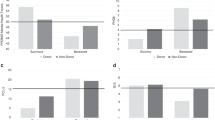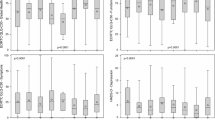Abstract
We have investigated whether hematopoietic stem cell transplantation (HSCT) before the death of children with cancer has a long-term effect on the physical and psychological well-being of the parents. A nationwide questionnaire was sent out to all bereaved parents in Sweden who had lost a child due to a malignancy from 1992 to 1997. Self-reported levels of anxiety, depression and quality of life as well as overall psychological and physical well-being in bereaved parents of children who underwent HSCT were compared with bereaved parents whose children did not receive a transplant. Bereaved parents whose children underwent HSCT had, according to a visual digital scale, an increased relative risk (RR) of long-term anxiety (RR 1.5; 95% confidence interval (CI) 1.0–2.1), poor psychological well-being (RR1.3; 95% CI 1.1–1.5), low quality of life (RR 1.4; 95% CI 1.2–1.7) and poor physical health (RR 1.3; 95% CI 1.1–1.5), whereas the State-Trait Anxiety Inventory and ‘The Göteborg Quality of Life Instrument’ were non-significantly increased (RR 1.3; 95% CI 0.8–2.3 and RR 1.7; 95% CI 0.9–3.3, respectively). The risks of these consequences were further augmented in case of multiple HSCT. We suggest that bereaved parents of children undergoing HSCT may be at greater risk of decreased psychological well-being than other bereaved parents of children with cancer.
This is a preview of subscription content, access via your institution
Access options
Subscribe to this journal
Receive 12 print issues and online access
$259.00 per year
only $21.58 per issue
Buy this article
- Purchase on Springer Link
- Instant access to full article PDF
Prices may be subject to local taxes which are calculated during checkout
Similar content being viewed by others
References
Forinder U . Bone marrow transplantation from a parental perspective. J Child Health Care 2004; 8: 134–148.
Vrijmoet-Wiersma CM, Egeler RM, Koopman HM, Norberg AL, Grootenhuis MA . Parental stress before, during, and after pediatric stem cell transplantation: a review article. Support Care Cancer 2009; 17: 1435–1443.
Vrijmoet-Wiersma CM, Egeler RM, Koopman HM, Bresters D, Norberg AL, Grootenhuis MA . Parental stress and perceived vulnerability at 5 and 10 years after pediatric SCT. Bone Marrow Transplant 2010; 45: 1102–1108.
Norberg AL, Boman KK . Parent distress in childhood cancer: a comparative evaluation of posttraumatic stress symptoms, depression and anxiety. Acta Oncol 2008; 47: 267–274.
Kreicbergs U, Valdimarsdottir U, Onelov E, Henter JI, Steineck G . Anxiety and depression in parents 4-9 years after the loss of a child owing to a malignancy: a population-based follow-up. Psychol Med 2004; 34: 1431–1441.
Drew D, Goodenough B, Maurice L, Foreman T, Willis L . Parental grieving after a child dies from cancer: is stress from stem cell transplant a factor? Int J Palliat Nurs 2005; 11: 266–273.
Ullrich CK, Dussel V, Hilden JM, Sheaffer JW, Lehmann L, Wolfe J . End-of-life experience of children undergoing stem cell transplantation for malignancy: parent and provider perspectives and patterns of care. Blood 2010; 115: 3879–3885.
Kreicbergs U, Valdimarsdottir U, Onelov E, Bjork O, Steineck G, Henter JI . Care-related distress: a nationwide study of parents who lost their child to cancer. J Clin Oncol 2005; 23: 9162–9171.
Kreicbergs U, Valdimarsdottir U, Onelov E, Henter JI, Steineck G . Talking about death with children who have severe malignant disease. N Engl J Med 2004; 351: 1175–1186.
Onelov E, Steineck G, Nyberg U, Hauksdottir A, Kreicbergs U, Henningsohn L et al. Measuring anxiety and depression in the oncology setting using visual-digital scales. Acta Oncol 2007; 46: 810–816.
Spielberger C, Gorusch R, Lushene P, Vagg P, Jacobs G . Manual for the State-Trait anxiety inventory (form Y). Consulting Psychologists Press: Palo Alto, 1983.
Radloff L . A self-report depression scale for research in the general population. Appl Psychol Meas 1977; 1: 385–401.
Tibblin G, Tibblin B, Peciva S, Kullman S, Svärdsudd K . “The Göteborg quality of life instrument”--an assessment of well-being and symptoms among men born 1913 and 1923. Methods and validity. Scand J Prim Health Care Suppl 1990; 1: 33–38.
Smith MY, Redd WH, Peyser C, Vogl D . Post-traumatic stress disorder in cancer: a review. Psychooncology 1999; 8: 521–537.
Pelcovitz D, Goldenberg B, Kaplan S, Weinblatt M, Mandel F, Meyers B et al. Posttraumatic stress disorder in mothers of pediatric cancer survivors. Psychosomatics 1996; 37: 116–126.
Manne S, DuHamel K, Ostroff J, Parsons S, Martini DR, Williams SE et al. Anxiety, depressive, and posttraumatic stress disorders among mothers of pediatric survivors of hematopoietic stem cell transplantation. Pediatrics 2004; 113: 1700–1708.
Streisand R, Rodrigue JR, Houck C, Graham-Pole J, Berlant N . Brief report: parents of children undergoing bone marrow transplantation: documenting stress and piloting a psychological intervention program. J Pediatr Psychol 2000; 25: 331–337.
Gardner GG, August CS, Githens J . Psychological issues in bone marrow transplantation. Pediatrics 1977; 60: 625–631.
Oppenheim D, Valteau-Couanet D, Vasselon S, Hartmann O . How do parents perceive high-dose chemotherapy and autologous stem cell transplantation for their children. Bone Marrow Transplant 2002; 30: 35–39.
Wu J, Mu PF, Tsay SL, Chiou TJ . Parental experience of family stress during hematopoietic stem cell transplantation of pediatric patients in germ-free isolation in Taiwan. Cancer Nurs 2005; 28: 363–371.
Phipps S, Dunavant M, Lensing S, Rai SN . Psychosocial predictors of distress in parents of children undergoing stem cell or bone marrow transplantation. J Pediatr Psychol 2005; 30: 139–153.
Acknowledgements
The study was supported by grants from the Swedish Childhood Cancer Foundation, the Swedish Research Council, the Tobias Foundation and the Stockholm County Council. The funding bodies had no involvement in any part of the study.
Author information
Authors and Affiliations
Corresponding author
Ethics declarations
Competing interests
The authors declare no conflict of interest.
Rights and permissions
About this article
Cite this article
Jalmsell, L., Onelöv, E., Steineck, G. et al. Hematopoietic stem cell transplantation in children with cancer and the risk of long-term psychological morbidity in the bereaved parents. Bone Marrow Transplant 46, 1063–1070 (2011). https://doi.org/10.1038/bmt.2010.287
Received:
Revised:
Accepted:
Published:
Issue Date:
DOI: https://doi.org/10.1038/bmt.2010.287



